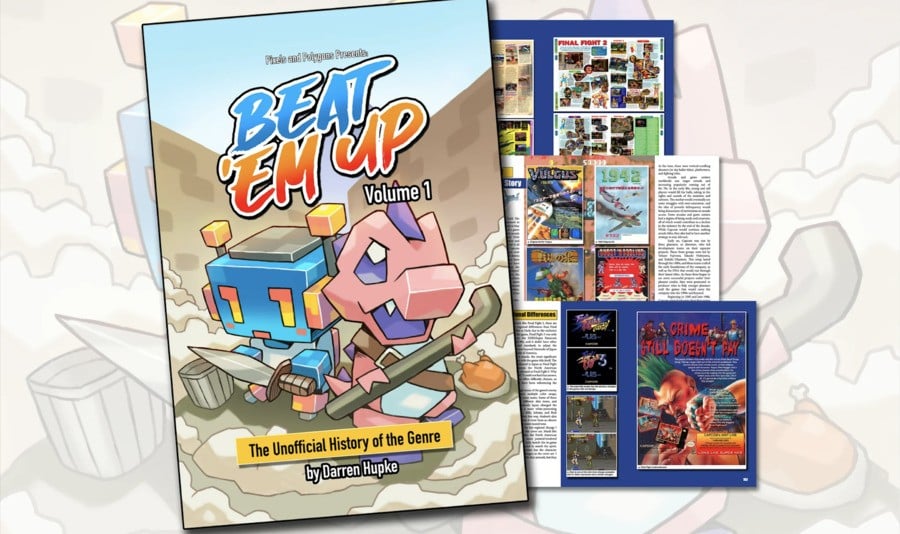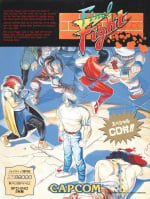
Update #2 [Fri 15th Aug 2025 15:00 BST]: Pixels and Polygons has announced that its book, Beat 'Em Up Volume 1, is finally available to buy after seemingly going through a bit of a retooling to ensure the book is safe for a legal release.
In case you weren't aware of the history of the project, Pixels and Polygons launched the initial Kickstarter campaign for the book earlier this year, back in January, with the title at the time being Beat 'Em Up Volume 1: The Unofficial History of Final Fight.
This campaign ended up hitting its $2000 target fairly quickly. However, it was then announced not long after that the publisher would have to cancel the campaign, following "a message concerning the use of intellectual property within the book". At the time, Darren Hupke, the founder of Pixels and Polygons, stated online that he could not go through with the campaign as he didn't want to put himself "in any legal situations", but stated that he was looking into the possibility of retooling or reworking the book "to comply with everything necessary for a legal release."
Now it appears the books is finally out, with the most noticeable changes being the name, which now reads Beat 'Em Up Volume 1: The Unofficial History of the Genre; and the front cover, which removes several screenshots that were present in the original.
Here's the latest description of the book:
"Beat 'Em Up is a 260 page book, the first in a series, that chronicles the genre's history by Darren Hupke. The series is planned to cover iconic game franchises such as Final Fight, Streets of Rage, and more across each volume. The books will focus in on a different chunk of the genre to give a curated look at what made these games special.
"In Volume 1, dig into 10 chapters of content that take a peek at the development details, story discussions, character biographies, level maps, classic reviews, regional differences, and more from the Final Fight series."
The book is available to buy now from Pixels and Polygons website as a softcover ($39.99) or hardcover book ($59.99). International copies, meanwhile, should be available to purchase through Amazon.
Update #1 [Fri 24th Jan, 2025 10:00 GMT]: Pixels and Polygons, the company behind Beat 'Em Up Volume 1: The Unofficial History of Final Fight, has announced on social media it has had to cancel the Kickstarter campaign for the book.
According to Pixels and Polygons founder Darren Hupke, the decision was made after receiving “a message concerning the use of intellectual property within the book”. Hupke did not specifically name who exactly sent him this message but has stated the situation has forced him to end the campaign prematurely and cancel the current funding to avoid putting himself “in any legal situations”.
As he goes on to state, no money has been taken from backers and nothing will happen with the current pledges. He also expressed an interest in reviving the book in the future, but he currently has no idea “how long" that will be "or even if” he will be able to do something like that.
Hupke writes, "I will try and open some communications with this party and will have to explore some copyright laws on how I can either retool or rework the project to comply with everything necessary for a legal release. I know there are Fair Use laws, but I am not looking to create a legal battle I cannot afford. With less than three days remaining on the campaign, I cannot take any chances that it will continue without a clear and safe resolution”
Speaking about this news, Hupke says that he is not "personally angry" and understands the outcome. Instead, he is just really disappointed the book might not be possible as it was a passion project from a lifelong fan of the series. You can follow Pixels and Polygons and Darren Hupke on BlueSky for more updates on the situation as it develops.
Original Article [Tue 14th Jan, 2025 12:30 GMT]: A new book is currently being crowdfunded on Kickstarter that aims to chart the history of Capcom's iconic Final Fight series.
Beat 'Em Up Volume 1: The Unofficial History of Final Fight is the work of the writer Darren Hupke, who was previously behind the 32 Bit Library series — a set of curated retrospectives of the PS1 library.
It is described as a "book made by a fan [...] for fans" and plans to chart the history of the series from the original 1989 arcade game all the way up until the final entry in the series (the PS2 and Xbox title Final Fight: Streetwise), across 10 chapters and 250+ pages.
In these chapters, Hupke intends to dig into the development history of each game, sharing plot summaries, character biographies, level maps, classic reviews, regional differences, and more, with the goal being to take players "back to the best parts of these classic experiences."
According to the Kickstarter, there will also be a couple of guest contributors too, including Rex Nabours (who has submitted some words for the Final Fight Revenge chapter) and Audi Sorlie (who is contributing articles about the franchise's music and sound design).
Already, the project has hit its $2000 target, having raised $5095 from 95 backers. But you still have 10 days left to secure your own copy if you've yet to back the book.
The cheapest option available is a $5 digital edition, but there are also physical editions ranging from a $40 softcover to a limited edition hardcover copy priced at $75 that includes a bunch of additional extras like a sticker, bookmark, art print, and an enamel pin.
You can find out more about the project here.








